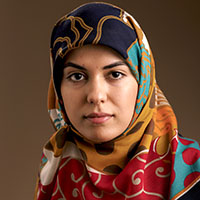

Email: skamali@caltech.edu
Position: PhD Candidate
Current Institution: California Institute of Technology
Abstract: Changing Perceptions in Optics: What Can a Thin Engineered Surface Do?
Over time, our understanding of light has undergone multiple paradigm shifts from confirmation of the wave nature of light to the formation of electromagnetic and quantum light theories. But the general perception of optics, i.e., how we manage the flow of light, has remained almost the same for millennia. Even today, optics reminds us of polished pieces of glasses lumped into systems. Recent advances in nanotechnology have presented a new route to optics using nanopatterned structures that enable precise control of optical wavefronts with subwavelength resolution. My research focuses on thin layers of engineered materials called metasurfaces that can dramatically alter what we perceive of optics and how this can lead to a paradigm shift in the design and fabrication of optical elements and systems. The main principle of optical element design is that the geometrical form of an object is directly correlated to its optical function; e.g., a spherical lens focuses light to a point while a cylindrical lens forms a linear focal spot. I developed flexible metasurfaces for decoupling the geometrical form and optical function of arbitrarily shaped objects. Ultrathin elastic metasurfaces can vastly shrink the size of tunable optical elements. For example, to make a lens with variable focal length conventionally, multiple optical elements are stacked together, creataing a large, heavy device. I demonstrated ultra-thin, ultra-light tunable lenses by radially stretching elastic metasurfaces. I am also interested in developing metasurfaces with enhanced control over light; an important limitation of a thin hologram is that it can only project one 3-dimensional image regardless of the angle of illumination. I have developed a new platform to circumvent this limitation by designing metasurfaces that allow for encoding two holographic images under different illumination angles without sacrificing resolution.
Bio:
Seyedeh Mahsa Kamali is a PhD candidate in the Department of Electrical Engineering at California Institute of Technology (Caltech) in the Nanoscale and Quantum Optics group led by Professor Andrei Faraon. She received master’s degree from Caltech and a bachelor’s degree from the University of Tehran, both in electrical engineering. Her research interests include design and development of novel miniaturized free space optical elements and systems with planar form factors and new functionalities. She has authored or coauthored over 50 papers in peer reviewed journals and conferences, and has filed 8 patents. Her research has been widely covered in the press, and has been featured in Science Physics, Tech Briefs, and Laser Focus World, among others. Honors include a second-place best student paper award at the IEEE Photonics Conference in 2016 and selection as an Everhart Lecturer at Caltech in 2018.

